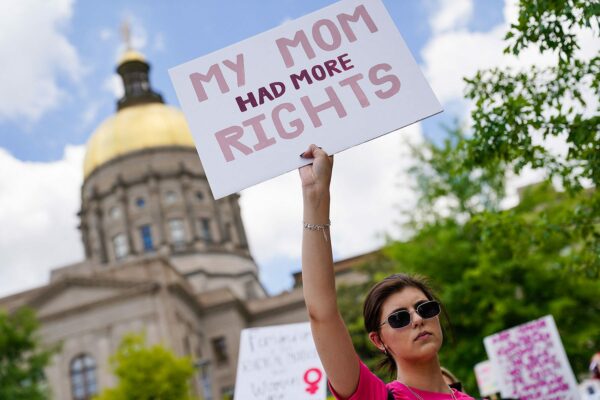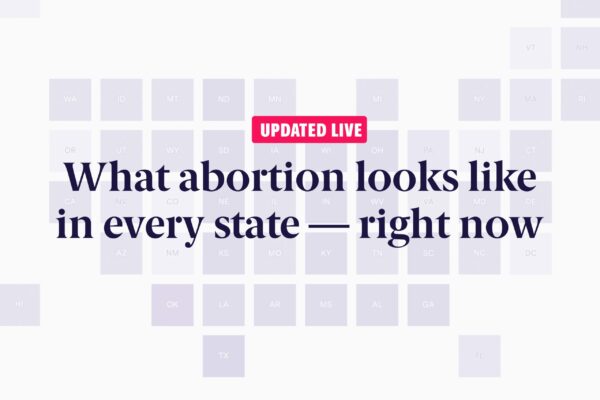Originally published by The 19th
The Supreme Court’s conservative majority on Friday overturned Roe v. Wade by finding that abortion is not a “liberty” protected by the 14th Amendment to the U.S. Constitution. Its writers did not specify that it was, they said.
The court’s liberal justices countered in a scathing dissent that of course the writers didn’t specify it, they were all men. At the time of the amendment’s passage, first-wave feminists were explicitly told that it “was not their time to seek constitutional protections.” They wouldn’t even get the right to vote for another 50 years.
“Of course, ‘people’ did not ratify the Fourteenth Amendment. Men did. So it is perhaps not so surprising that the ratifiers were not perfectly attuned to the importance of reproductive rights for women’s liberty, or for their capacity to participate as equal members of our nation,” Justice Stephen Breyer wrote on behalf of himself and Justices Elena Kagan and Sonia Sotomayor.
“Those responsible for the original Constitution, including the Fourteenth Amendment, did not perceive women as equals, and did not recognize women’s rights,” Breyer continued, adding that the court may as well rely on standards from the Dark Ages, and that this “consigns women to second-class citizenship.”
Breyer’s dissent on behalf of the court’s dwindling liberal wing was in the case Dobbs v. Jackson Women’s Health Organization, concerning a 15-week abortion ban in Mississippi. The court’s 6-3 conservative majority said that the law could stand. Five of them also agreed that “the Constitution does not prohibit the citizens of each state from regulating or prohibiting abortion.”
-
More abortion coverage
- Roe v. Wade has been overturned. In these states, abortion access will no longer be accessible.
- From marriage equality to interracial marriage, Supreme Court conservatives appear divided on handling civil rights after Roe decision
- Here’s when each trigger law banning abortion could go into effect
In doing so, they tossed out the court’s 1973 Roe decision establishing the right to an abortion, along with its 1992 ruling in Casey v. Planned Parenthood that affirmed it. “The court overrules those decisions and returns that authority to the people and their elected representatives,” Justice Samuel Alito wrote on behalf of a five-justice conservative majority.
“The majority tries to hide the geographically expansive effects of its holding. Today’s decision, the majority says, permits ‘each State’ to address abortion as it pleases. That is cold comfort, of course, for the poor woman who cannot get the money to fly to a distant state for a procedure,” Breyer writes.
States will indeed now determine whether people have access to abortion care and to what extent. There are 13 states with so-called “trigger laws” on the books that were written to ban abortion if and when Roe was overturned. As of late Friday afternoon, at least five — Arkansas, Kentucky, Louisiana, Missouri, South Dakota — had already taken effect. Other states have pre-Roe statutes on the books restricting abortion that will again be in place. Some Republicans in the House of Representatives will soon introduce a proposed federal 15-week ban based on Mississippi’s law.
The conservative majority in the Dobbs case said that one problem with Roe and Casey is that they can be difficult to implement — Casey said states could place restrictions on abortion, for example, so long as it didn’t create an “undue burden” for people to obtain one. But determining undue burdens is left up to the courts. Breyer argues that the new patchwork of state laws taking effect will create even greater legal chaos.
-
The Latest:
“Must a state law allow abortions when necessary to protect a woman’s life and health? And if so, exactly when? How much risk to a woman’s life can a state force her to incur, before the Fourteenth Amendment’s protection of life kicks in?” Breyer asks.
He walks through examples. First, a birthing parent with pulmonary hypertension who has a 30 to 50 percent risk of dying if they continue the pregnancy. Then, is using dilation and evacuation or medication for miscarriage management an abortion? What about someone who travels across state lines after their home state bans abortion care? Can health care providers in a state that protects access to abortion send medication to a patient in another state?
“The Constitution protects travel and speech and interstate commerce, so today’s ruling will give rise to a host of new constitutional questions. Far from removing the Court from the abortion issue, the majority puts the Court at the center of the coming ‘interjurisdictional abortion wars,’” Breyer wrote.
Breyer reserves the bulk of the dissent to examining whether Friday’s ruling will change what it means to be an American who can give birth in 2022, when more than half the U.S. population is now not fully covered by the privacy rights implied in the 14th Amendment.
“The loss of power, control, and dignity will be immense,” he writes.
“As of today, this Court holds, a state can always force a woman to give birth, prohibiting even the earliest abortions. A state can thus transform what, when freely undertaken, is a wonder into what, when forced, may be a nightmare,” he continues.
This is the picture that Breyer paints: It is highly likely that some day very soon a woman will be forced to bear her rapist’s child — even if it is a young girl pregnant by her father. Pregnant parents could be compelled to carry fetuses to term that have severe physical abnormalities and cannot survive outside the womb. Abortion providers could face criminal liability — and abortion patients, too.
“Whatever the exact scope of the coming laws, one result of today’s decision is certain: the curtailment of women’s rights, and of their status as free and equal citizens,” Breyer wrote.
“After today, young women will come of age with fewer rights than their mothers and grandmothers had.”



